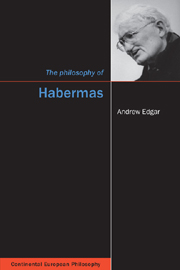6 - Modernity
Summary
Introduction
In the early 1980s Habermas gave a short address entitled “Modernity – An Incomplete Project”, first in German in Frankfurt and then in English in New York. This address clearly summarized the change that Habermas's thought had undergone since the late 1960s. In part this change was due to the “linguistic turn” that had seen him shift the very foundation of philosophical inquiry away from the subjectivity of consciousness to the intersubjectivity of communication. Yet perhaps more fundamentally, “Modernity – An Incomplete Project” marked a recognition of the change that European intellectual culture had undergone since the 1960s. In the 1960s Habermas was primarily concerned with the problems posed by positivism and scientism. At stake was the self-understanding of the social sciences, and the impact that a positivistic social administration would have upon the democratic constitution of society. Habermas was, at that time, predominantly in debate with fellow Germans. His contribution to the positivism dispute, and his exchanges with Gadamer are typical of this period (see § “Late capitalism”, p. 5 and § “Hermeneutics (Gadamer), p. 81). By the 1980s, Habermas's concerns had shifted from the threat of a misplaced positivism to the dangers of grounding social and philosophical inquiry in the philosophy of consciousness; which is to say, the sociological and philosophical traditions had failed to recognize, with sufficient rigour, the intersubjective and communicative nature of human existence.
- Type
- Chapter
- Information
- The Philosophy of Habermas , pp. 188 - 242Publisher: Acumen PublishingPrint publication year: 2005



